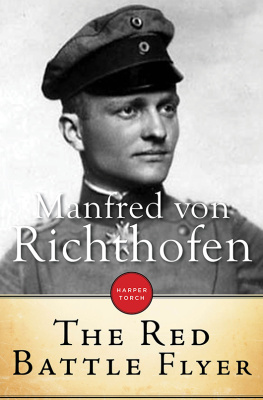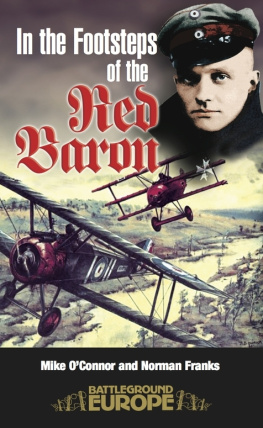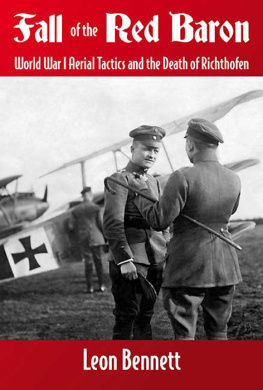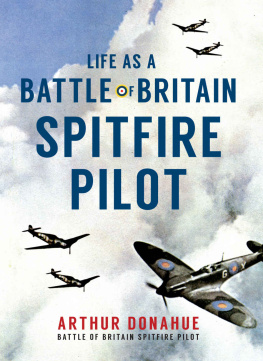Some time ago a naval officer who was engaged on particularly hazardous duty was discussing calmly the chances that he and his like had of surviving the war, assuming that it continued for several more years and that his particular branch of it increased its intensity. He wound up his remarks by saying, The chief reason why I particularly want to survive the finish is that Im so keen on comparing notes with our opposite members in the German Navy.
That is the answer to those who ask, as an important official gentleman asked recently, why this English translation of Rittmeister von Richthofens book should be published. It gives our flying people an opportunity of comparing notes with one of Germanys star-turn fighting pilots, just as that excellent book by Contact gives the Germans the chance of gathering the atmosphere of the Royal Flying Corps as it was in 1916 and 1917.
The Red Battle-Flyer has evidently been carefully censored by the German authorities. Also it has possibly been touched up here and there for propagandist purposes. Consequently, although the narrative as it stands is extraordinarily interesting, the book as a whole is still more interesting on account of what one reads between the lines, and of what one can deduce from the general outlook of the writer. There is, perhaps, little to learn of immediate topical interest, but there is much that explains things which were rather difficult to understand in the past, and the understanding of such points gives one a line of reasoning which should be useful to our active-service aviators in the future.
When one makes due allowance for the propagandist nature of the book, which gives one the general impression of the writing of a gentleman prepared for publication by a hack journalist, one forms a distinctly favorable mental picture of the young Rittmeister Baron von Richthofen. Our old friend Froissart is credited with the statement that in his age of chivalry it was always impossible to inculcate into the German knights the true spirit of knightliness. Which seems to indicate that the practical German mind of those days could not understand the whimsicalities of the Latin ideas of chivalry, whichfor examplebade a knight against whose shield an opponent brake his spear haul off out of the fight till the lance-less enemy unsheathed his sword and drave into the combat again. Probably the Hun of those days proceeded to stick his opponent in the midriffwherever it may beand so finished the fight.
In the same true spirit of knightliness an Englishman knocks a man down and then stands back so that he can get up and have another chance, whereas a more practical person would take excellent care that his opponent never got up till he had acknowledged himself beaten. It is all a matter of the point of view, and largely no doubt a matter of education. However, making due allowance for the point of view, one finds surprisingly little Hunnishness in von Richthofens manners or methods as set forth in print.
It is one of the accepted facts of the war that the German aviators have displayed greater chivalry than any other branch of the German services. It was a common occurrence for their pilots to fly over our lines in the course of their business, and, by way of variety from that business, to drop packets containing letters from captured British aviators, or the personal belongings of the dead. One gathers that these acts of courtesy have become less frequent of late, owing to the intensification of aerial warfare, but it seems that captured and killed aviators still receive the full courtesies of war from the German aviators, whatever may be the fate of prisoners in other hands afterwards.
It is not surprising therefore to find that, taking him all round, Rittmeister von Richthofen conveys to one the general impression that, mutatis mutandis, he is very like an English public school boy of good family. His egotism, as one finds it in the book, is the egotism of a young man who is frankly pleased with himself, but is more elated by his good luck than by his cleverness.
Taking him by and large, one rather likes von Richthofen, and one fancies that most of the R.F.C. people who have fought him would be quite pleased after the war to sit at table with him and compare notes over the cigarettes and liquors, as my naval friend wants to do with his pre-war friends of the German Navy. And there are unhappily not too many of our present enemies of whom one would like to express such an opinion.
When one comes to read into the book one begins to find many interesting things about the German Army, and the war in general, as well as about the German Feldfliegertruppenor Flying Service. The German is not really a skilful censor. Just as certain portraits painted by an artist at Ruhleben conveyed by the expression of the faces a good deal that Germany would like hidden, so von Richthofens book, though carefully censored, lets out quite a good deal of information.
The first thing that strikes one is that Germanys standing army at the beginning of the war was nothing like so perfect a fighting machine as we in this country believed. Although, like all the people with any sense in this country, the German Army knew that a war was coming, the officers and men seem to have set about their work in a singularly amateurish way, judging by the short section of the book devoted to the opening of the war on the Russian front. And one is pleased to find that von Richthofen has the grace to laugh at himself and his brother-officers for their mistakes.
In some ways the soldiers of all nations resemble one another strongly. For instance, one finds in this book the same contempt for what the Germans picturesquely call a base-hog, as the French have for the embusqu and as the British front-line officer has for the young and able-bodied officer who is Something on the Staff. This obnoxious breed is the same in all armies, and must be clearly distinguished from the carefully trained and expensively educated general staff officer, who is very much of a specialist and is the very brain of the army.
When we come to the purely aviatic portion of the book one finds more of the real von Richthofen and less of the cavalry officer. His honesty about his utter mental confusion the first time he went into the air recalls General Branckers famous remark in his lecture to the Aeronautical Society when he said that no one ever sees anything at all during his first hour in the air owing to the hopeless confusion in his mind caused by the novel aspect of everything. Von Richthofens description of his experience is about the best thing that has been written on the subject.
An interesting bit of information is disclosed in his description of his flight in a Grossflugzeug, on September 1st, 1915. At that period little was known about twin-engined aeroplanes. The Germans were known to have tried them, but they were not a success. The only example known to our peoplethough probably there were actually several different machineswas commonly known in the R.F.C. as Wong-wong, on account of the curious noise made by the engines or air-screws when they got out of phaseas an electrician might call it. This noise is now quite familiar to the inhabitants of Southeastern England as the characteristic note of the Gotha bombers.
Von Richthofens good judgment of fighting values, though he was then only an observer, and a novice at that, is shown by his disapproval of the twin-engined aeroplane as a fighting machine. It is also of interest to learn that at that period the Germans had tried an auto-lock device to hold the rudder of a twin-engined machine over to one side so that it would fly straight if one engine went out of action, an ingenious idea even if foredoomed to failure.











